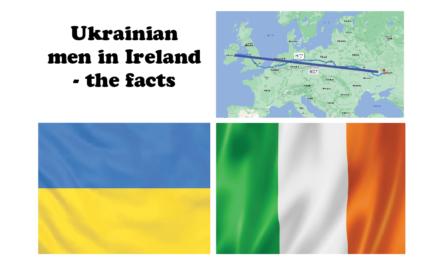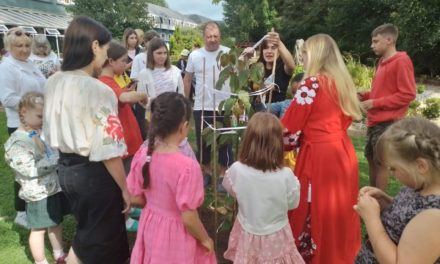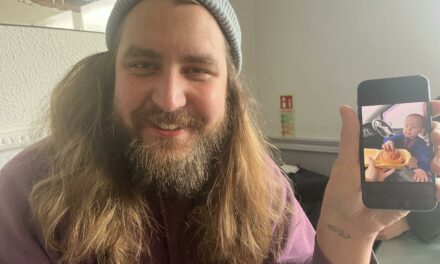Tetiana (Tania) Kovalova from Ukraine has been working with Sisk to build modular homes for fellow refugees. Her work in Ireland fuels her dream of one day helping to rebuild Ukraine.
She has been working since the first week she landed in Shannon Airport in May 2022. She came here devastated over what she left behind, nervous of what lay ahead, carrying a small bag, her passport and €300 in savings. She came alone, speaking no English.
Back home, as Russia’s war on Ukraine enters a third year, some of Tania’s close friends serving on the front line have been killed or injured. She remains in daily contact with friends and family, and since her Irish hosts and employers made her feel safe here – and productive – she channels her earnings and spirit into the war effort.
Government figures show that Tania is one of 24,000 Ukrainians employed in Ireland, 17,000 of whom are full-time like her. There are 1,000 employed in construction. Separate figures from a survey conducted by Ukrainian Action in Ireland suggest the numbers in work may be much higher.
In Tania’s case, her hosts provided transport that enabled her to find paid employment quickly. She has never missed a day.
Asked why she took on work so soon after landing in Ireland, she said: “Because I no like sitting in house. I have respect for myself and my host family and if people ask, ‘Are you working?’ I then say ‘Yes, in a restaurant, as dish wash manager!’
“I want to work. I don’t want sit in one place. I like growing. Work connects people. It is good meeting people. Good for social stability. For me it’s very important to have work and have work colleagues. I no understand people who don’t work,” Tania said.
She is grateful to her Irish employer, not least because she now speaks better English, which she learned in the workplace. Sometimes she reads children’s books about Irish legends, because the text is easy to follow. If she had time she would go to classes, but work, commuting and cooking fill her days.
Kremenchuk
In Ukraine, Tania grew up in a quiet village – still quiet thankfully – and her parents and younger sister live there to this day. She had moved as an adult to the city of Kremenchuk in central Ukraine, where she bought a sixth floor apartment facing, unfortunately, a large, city centre, military installation.
The first bombs fell on the city on April 2, and Tania made tentative enquiries about leaving. She heard through word of mouth about someone in Ireland offering accommodation, and they were vouched for through a network of friends, so she contacted Patrick Morrissey, who had a farmhouse with spare rooms outside Thurles, Co. Tipperary.
However, Tania was nervous – who was this man? Also, she was still unsure about leaving her country, her family and friends behind. Then, on May 12, her entire apartment block shook from missile attacks. The next day, she fled.
Tania reminded me about an attack on a shopping mall in June 2022 when more than 20 people were killed and 59 injured. “That was Kremenchuk,” she said.
Ukraine’s largest oil refinery is located on the city’s outskirts and is a key Russian target. (It is 10km from the bombed shopping mall).
Tania revealed: “My parents live in village – it is safer. My younger sister also. She has two children, 13 and eight. Her husband now soldier in front line. Most of my friends also now on front line.”
5am start
Tania’s first job was washing dishes in a local restaurant. After three weeks, through her hosts, she heard about a job in a canteen with a construction company headquartered in Dublin. She got the job and for eight months she rose at 5am to catch the early morning train from Thurles to Dublin – her host family kindly provided a lift to the station.
Tania was nervous joining a big company. “I no understand nothing. No English, only with phone and pen and paper. Not even very good now.
“I go to Dublin – it’s very big office. Big bosses with lots of money, and I’m a temporary protection lady,” she said. Tania recalls the receptionist calming her down, saying “Don’t worry”.
When the canteen manager went on holidays, Tania found herself in charge. “I have to cook for big meetings and I don’t understand English. One man had a watch that I think is more valuable than my apartment in Kremenchuk. ‘Hello Tania’, they say. ‘Thanks you Tania’, they say. After day one, other days easy.”
Moving on
She was working for seven months in the canteen when, cycling through Thurles one day, she spotted a Sisk flag on a building site. She worked for Sisk.
“Next day I say to Nick Morrissey – I’m ready for working with a shovel.”
Tania had qualified in Ukraine as a land surveyor. She was called for interview and taken on to help on the Thurles project – building 64 modular homes for fellow refugees from Ukraine.

• Tania at work in Thurles, Co. Tipperary, on the site of modular housing for fellow Ukrainian refugees
On completion, she moved with Sisk to Rathdowney where they were midway through building 44 modular houses. She rented a room from an Irish woman called Mary Hennessy, “An amazing lady, perfect – she’s my Irish mammy now”.
Currently she lives a 15-minute walk from a Sisk site in Lucan, renting a room in a family house: “They’re from South Africa. Good family. Nice house.”
Salary supports war effort
Asked how she spends her salary, Tania replied: “I help my parents in Ukraine. They have only €100 a month pension. I help my army every month because lots of my friends are now in zero line (frontline) in the war. I send money to girls who make camouflage for technics and sometimes it helps them to buy car or jeep for war. I don’t make big money in Ireland.” Tania is saddened by what she calls a lost generation of men from Ukraine – killed on the battlefront.
Friendships forged in mountains
Regarding corruption in the Ukrainian military, Tania remarked: “I can’t change that, but money I send is safe from corruption. It’s between friends. I trust them. I climbed many mountains with them. A few guys now died, some lose legs and no climb no more. One guy no more have eyes, very nice guy. We climbed to base camp in Mount Everest.
“Ten years I climbing. Crimea was my first hike. I said I’m never going again because it’s so hard. Next thing, I see it’s very beautiful. Next, I climb Carpathian mountains – 2,048 metres. More hard. Next Mount Elbrus in the Caucasus Mountains in Russia. Caucasus people have very hot blood. They say they’re not Russian,” said Tania.

• Tania climbing before Russia attempted a full-scale invasion of Ukraine.
Few friends in Ireland
“I not have too much friends in Ireland. Morrisseys and my job friends. I’m not too much meeting Ukrainian people in Ireland – I don’t have time,” she added.
Ukrainian Independence Day is an opportunity each year to meet compatriots, but Tania has not taken part. “For me it’s very sad,” she said.
Racism in Dublin
Racism is on the rise in Ireland and Tania has experienced it. “I know a very big racist. Sometimes I’m afraid in Dublin. I have little Ukrainian flag on my bag. A man in Dublin, he sees it and he doesn’t like me – he say bad things. Sometimes I’m afraid to have this flag because somebody might throw stones at me, but still I keep it,” she explained.
Tania tries to understand the racism through the lens of a popular Ukrainian folklore story:
“With all people, whether Irish, French, Ukrainian, Gypsy – there are some good, some not. In Ukrainian folklore – if you put just one spoon of oil into a pot of honey, it makes the honey taste bad, but the honey is still there.”
She believes narrow-minded Irish people see what they see, and they do not see the Ukrainian people who are working. “The racists see only bad people. I see nobody because I’m working,” she said. Tania laughed when asked was she fearful of being attacked in Rathdowney or in Thurles: “In the countryside everybody is friendly.”
Dreams for future
Tania baked a cake when she was leaving the canteen job to start on the modular homes in Thurles. “I make big cake for the bosses to say thanks for the job and for trusting me for future. My first and last dream is helping to rebuild Ukraine, so this experience is very important for myself.”
She said of Sisk: “It’s a perfect company, everybody nice.” They better understand her situation now and her dreams for the future and how her experience building in Ireland serves a purpose.
After our interview Tania texted me to add that at work she feels “completely safe, from the safety of construction and the preservation of my health and life, to my personal mental health and comfort”. “The company always takes care of its employees regardless of their status on the career ladder,” she added.
Last year, Tania returned to Ukraine for the first time, visiting family and friends in her home village. Her apartment block in the city still stands, but sirens wailed every day she was there – she showed me videos and the many bombing alerts on her phone from that visit.
Her older sister, who lives in Czechia, has visited her in Ireland and she hopes her younger sister will visit this year. Their parents, now elderly, do not want to leave their village and so Tania looks forward to taking annual leave in October and returning to see them for a fortnight.
She will tell them good things about Ireland and her Irish family, her Irish mammy and Sisk. “I have little and maybe big dreams for after the war. Maybe Sisk come to Ukraine to help rebuild,” Tania said hopefully.
See the funny side
Tania was afraid of losing her passport and being killed before she left Ukraine – then nobody would be able to identify her body and inform her family. That need to have her passport within reach at all times stayed with her for a long time.
Her paranoia is something she can now see a darkly funny side to, helped on by her Irish hosts. Overhearing us talk, Patrick Morrissey piped up, asking: “Hey Tania, where’s your passport?”
He coaches football and hurling teams and is used to helping people overcome defeat. While hosting refugees is on a whole other level, four Ukrainians have so far stayed for extended periods with Patrick, Nicholas and Tim Morrissey and it has gone well for them. All are working or studying now and have integrated into Irish society, but Tania stands out as the one who went to work one week after arriving.

• Pat Morrissey.
Volunteers
As a Tipperary household, the Morrisseys are in good company when it comes to volunteering. Last year, nearly 26,000 people in the Premier County volunteered, according to the latest census data. That’s 15% of the people living in Tipperary. A fifth of volunteers were involved, in 2022, in more than one voluntary activity. The average age of a Tipperary volunteer is 48, with the 45-64 age group the most active volunteering, possibly because that age cohort has more free time.
The data was contained in data released on February 1 by the Central Statistics Office. The Census of Population 2022 Spotlight Series: Volunteering in Ireland showed that, nationally, 711,379 people volunteered in 2022 representing 14% of the total population.





